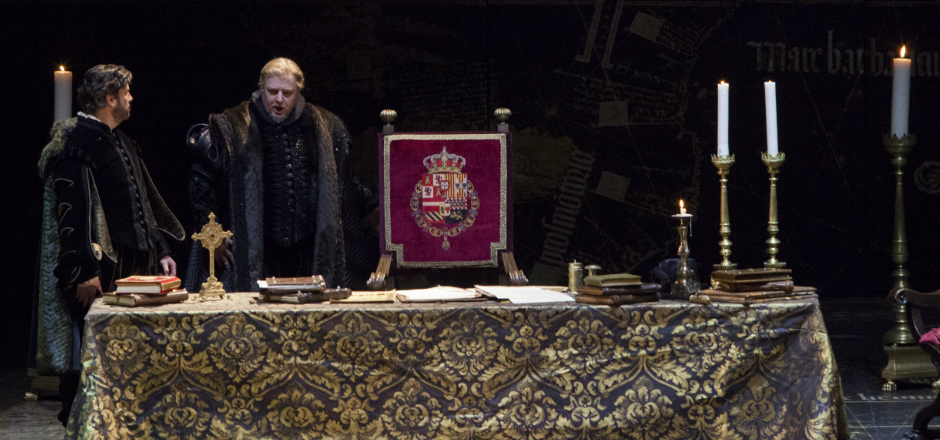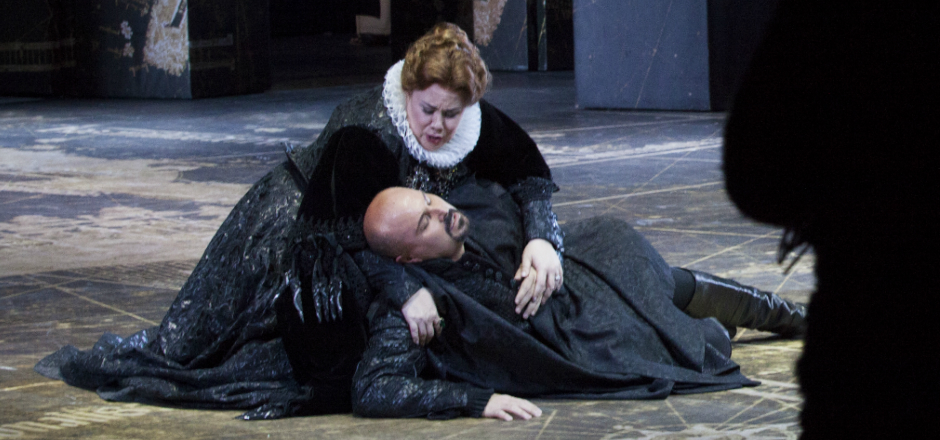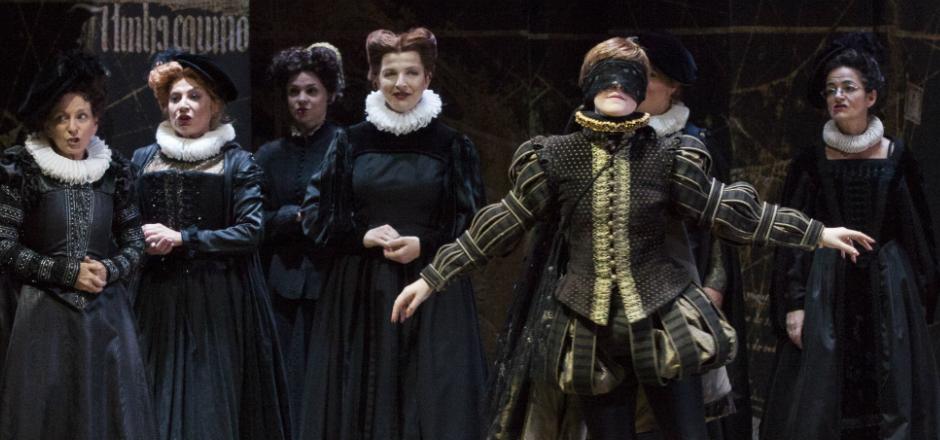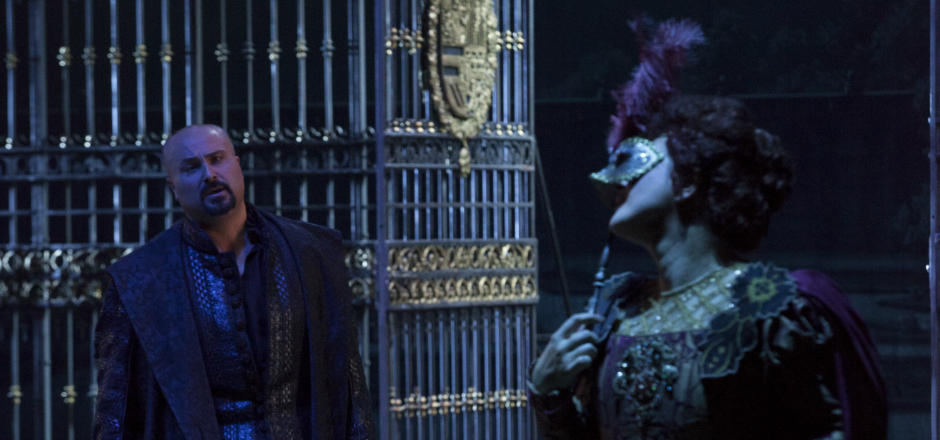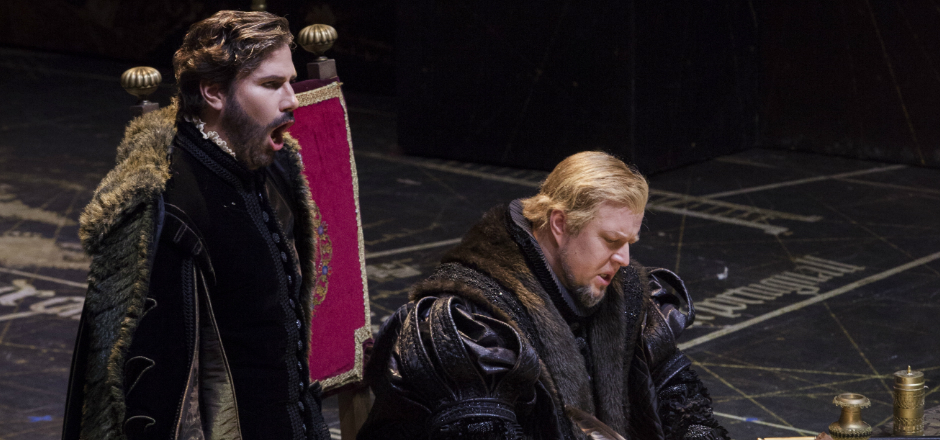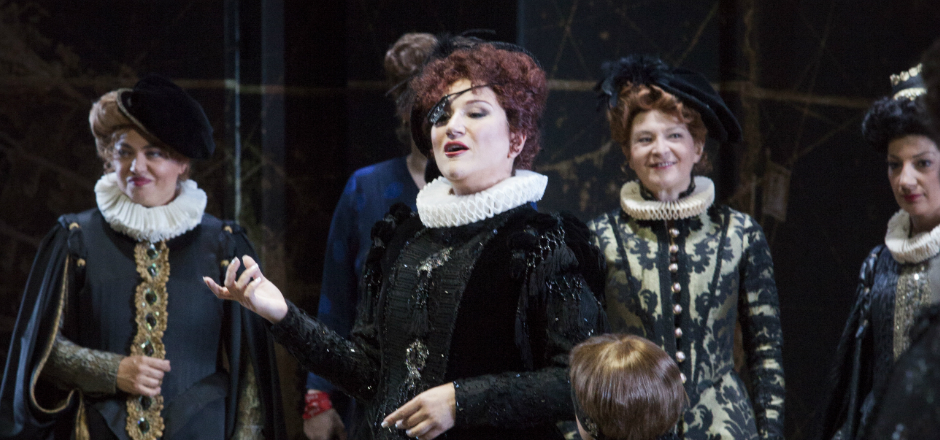80° Maggio Musicale Fiorentino
Opera
Don Carlo
Giuseppe Verdi
Don Carlo
Opera in four acts
Music by Giuseppe Verdi
Libretto by Joseph Méry and Camille du Locle
First performance: 11 March 1867 at the Théâtre de l'Académie Impériale de Musique in Paris
Staging by ABAO-OLBE of Bilbao, the Fundación Ópera de Oviedo, the Teatro de la Maestranza de Sevilla and the Festival Ópera de Tenerife
With surtitles in English and Italian by Prescott Studio, Firenze in cooperation with Inserra Chair (Montclair State University) and ICAMus, USA
Artists
Conductor
Zubin Mehta
Director
Giancarlo Del Monaco
Associate director
Sarah Schinasi
Scenes
Carlo Centolavigna
Costumes
Jesús Ruiz
Light design
Wolfgang von Zoubek
Choir director
Lorenzo Fratini
Orchestra and Choir of the Maggio Musicale Fiorentino
Zubin Mehta
Director
Giancarlo Del Monaco
Associate director
Sarah Schinasi
Scenes
Carlo Centolavigna
Costumes
Jesús Ruiz
Light design
Wolfgang von Zoubek
Choir director
Lorenzo Fratini
Orchestra and Choir of the Maggio Musicale Fiorentino
Don Carlo
Roberto Aronica
Elisabetta di Valois
Julianna Di Giacomo
Filippo II
Dmitry Beloselskiy
Rodrigo, marchese di Posa
Massimo Cavalletti
Principessa Eboli
Ekaterina Gubanova
Il Grande Inquisitore
Eric Halfvarson
Un frate
Oleg Tsybulko
Una voce dal cielo
Laura Giordano
Tebaldo
Simona Di Capua
Il Conte di Lerma
Enrico Cossutta
Un araldo reale
Saverio Fiore
Deputati fiamminghi
Tommaso Barea
Benjamin Cho
Qianming Dou
Min Kim
Chanyoung Lee
Dario Shikhmiri
Figuranti speciali
Elena Barsotti
Chiara Catelani
Gaia Mazzeranghi
Ylenia Mendolicchio
Mauro Barbiero
Cristiano Colangelo
Pierangelo Preziosa
Leonardo Velletri
Roberto Aronica
Elisabetta di Valois
Julianna Di Giacomo
Filippo II
Dmitry Beloselskiy
Rodrigo, marchese di Posa
Massimo Cavalletti
Principessa Eboli
Ekaterina Gubanova
Il Grande Inquisitore
Eric Halfvarson
Un frate
Oleg Tsybulko
Una voce dal cielo
Laura Giordano
Tebaldo
Simona Di Capua
Il Conte di Lerma
Enrico Cossutta
Un araldo reale
Saverio Fiore
Deputati fiamminghi
Tommaso Barea
Benjamin Cho
Qianming Dou
Min Kim
Chanyoung Lee
Dario Shikhmiri
Figuranti speciali
Elena Barsotti
Chiara Catelani
Gaia Mazzeranghi
Ylenia Mendolicchio
Mauro Barbiero
Cristiano Colangelo
Pierangelo Preziosa
Leonardo Velletri
Scene One. The cloisters of St Yuste, with the chapel where Charles V, father of Philip II, is buried.
Don Carlos goes to pray on the tomb of Charles V: he sadly regrets the love lost for ever since Elizabeth’s marriage to Philip. A Friar approaches him and whispers to him that only in heaven can a man find peace: the young man seems to recognise the voice of Charles V and is overcome. Rodrigo appears: he is Marquis of Posa and a friend of Carlos’s, and he entreats him to go and help the Flemish people who are oppressed by the tyranny of Philip. Carlos, in turn, confesses to his friend his love for the queen and its doomed outcome. Rodrigo is amazed at this revelation and tries to convince the Infante to forget his passion and leave for Flanders: the two friends swear eternal friendship in the common cause of freedom. Philip arrives with Elizabeth at his side and Carlos tries in vain to conceal his emotion.
Scene Two. In the gardens of the convent of St Yuste.
The queen’s maidservants are awaiting her departure from the convent: among them is the lovely and influential princess Eboli who sings a happy, Saracen love song. Elizabeth enters, and her sadness is in contrast with the general gaiety. Tebaldo announces the arrival of Rodrigo, who, while handing to her a letter entrusted to him by her mother in Paris, surreptitiously passes the queen a note; trying to control her feelings Elizabeth reads it: it is a message from Carlos who implores her to back the Marquis of Posa. Rodrigo urges her to meet the Infante, who is full of anguish, and persuade Philip to support their cause, while Eboli mistakenly believes that the sadness of the prince, with whom she is secretly in love, is proof that he loves her. Rodrigo cleverly succeeds in turning everybody away from the queen so that Carlos can speak to her alone: first he asks her to intercede with his father in order that he be allowed to leave for Flanders, then he breaks into a passionate declaration of love, but the queen, in spite of her excitement and emotion, reminds him that she is now Philip’s wife and that love between them is now impossible. Carlos flees in despair, while Elizabeth implores the help of God. The king enters and finding the queen by herself, angrily orders the Countess of Aremberg, who is guilty of leaving the queen alone, to return to France immediately. As the Countess departs, Elizabeth affectionately bids her farewell. Philip insists that Rodrigo remain with him: Rodrigo, who has been sadly impressed by the harshness of the Spanish domination in Flanders, dares to make a request for the freedom of that country; Philip, still liege to his despotic convictions, admires Rodrigo’s courage; he is the only person to speak with the frankness of a free man among all the servile courtiers: Philip forgives Rodrigo his audacity but warns him to beware of the Grand Inquisitor. Then the king opens up his heart to him and confesses his suspicions of the reciprocated feelings of love between the Elizabeth and Carlos: he asks Rodrigo to watch them. While Rodrigo accepts, happy in the hope of being able to help his friend, the king takes his leave, begging him again to beware of the Grand Inquisitor.
Act II
Scene One. The gardens of the Queen.
Carlos has received a note from a mysterious woman who invites him to a night-time tryst. Believing it was written by Elizabeth, he is overcome with joy, but the veiled woman who has written these passionate words is not Elizabeth, but the Princess Eboli. When the latter, now certain that the Infante loves her, removes her veil, Carlos, in terror, fears he has been betrayed. Eboli offers him her love; Carlos refuses her in embarrassment and the princess, guessing that Carlos’s affections are for his stepmother, threatens to revenge herself by revealing her suspicions to the king. The Marquis of Posa then arrives and tries to calm the Princess, who, blinded by jealousy, insists in her intentions. Rodrigo, realising the dangers to which his friend is exposed, convinces him to hand over all the compromising documents regarding Flanders.
Scene Two. A large square in front of the Cathedral of Our Lady of Atocha.
The Court and people are assembled to watch the “autodafé”, the burning at the stake of heretics condemned by the Holy Office. When Philip appears, Carlos suddenly invites the Flemish deputies to enter, and they fall at his feet imploring justice and freedom for their people. The king harshly denies them access and gives orders for them to be sent away. The Infante then intervenes claiming the government of Flanders for himself. At the king’s angry refusal, Carlos unsheathes his sword in an act of rebellion. Philip disdainfully orders his nobles to disarm his son but no one dares carry out the order until Rodrigo, in order to save his friend, comes forward and makes him hand over the sword. Then the king and queen continue their progress toward the “autodafé” while in the distance the flames of the stake can be seen to rise and a voice from heaven comforts the condemned.
Act III
Scene One. The King’s closet.
Philip is absorbed in deep and bitter meditation. He is oppressed by the certainty that Elizabeth does not love him and suspects he is betrayed by his wife and son; he would like to be able to read into the hearts of his loved ones. It is dawn when the Grand Inquisitor arrives. The King asks the powerful and terrible friar whether a Christian king like himself can condemn to death his own son and still have the Church’s absolution. The Inquisitor says he can. For the good of the State, all is licit: even God sacrificed his Son in order to redeem us. He turns to Philip and reproaches him for the dangerous liberal ideas that are circulating in his kingdom under the influence of the Marquis of Posa and prays him to agree to condemn Posa to death. The King, who believes that in Rodrigo he has found a loyal and faithful friend, refuses, after which the Inquisitor goes as far as darkly threatening to bring the King before the Tribunal of the Inquisition. Although he is offended in his kingly status, Philip is forced to give in, bitterly affirming that between the “throne” and the “altar” it is always the first that has to give way. The queen then rushes in begging for justice to be dealt to those enemy courtiers who have stolen the coffer in which she keeps her jewels and dearest possessions. The King takes a small coffer from the table and shows it to her, ordering her to open it. At her refusal, Philip angrily breaks it open and, finding the portrait of Carlos, is even more convinced his suspicions are well-founded. Seeing her husband’s anger, Elizabeth disdainfully defends her own honour, reminding him that she was once Carlos’s promised bride. Philip, losing control of himself, vulgarly accuses her of committing adultery: the queen, wounded by the unjust accusation, swoons. Rodrigo and Eboli run to her aid: Posa blames the King for his behaviour and thinks the right moment has come to take action. Philip, impressed by his wife’s pride, is intimately convinced of her innocence. Eboli, left alone with the queen and tormented by remorse, confesses that it was she, in love with Carlos and blind with jealousy, who stole the coffer. She then reveals an even greater sin: she has been the King’s lover. The Queen icily orders her to choose between banishment and the convent. Eboli curses her own beauty, the cause of so many errors, and swears to save Carlos.
Scene Two. Carlos’s prison.
Posa comes and announces Carlos’s liberation. In order to save his friend he has had the compromising documents, which had been entrusted to him by a friend, found on his own person. These documents prove his participation in the revolution of Flanders. Rodrigo is certain that the revenge of the King and the Inquisitor will not long be delayed. He prays Carlos, once he is King, to grant freedom to the Flemish people. A deathly shot from the harquebus of a hired archer of the Holy Office strikes Rodrigo: he dies in the arms of his friend, confiding to him that the following day Elizabeth is expecting him at the convent of St Yuste. Meanwhile Philip appears, ready to free his son, but Carlos, in despair at the death of Rodrigo, tells him that his friend has sacrificed himself in order to save him, Carlos. The King is bitterly sorry to have lost such a loyal subject, while the Infante swears to continue his friend’s work. Meanwhile the people in revolt cry out for the liberation of Carlos, but the Grand Inquisitor intervenes, and succeeds in imposing his own authority, ordering the people to prostrate themselves before the King.
Act IV
The Cloisters o the convent of St Yuste.
Elisabetta prays on the tomb of Charles V. She looks back to her youthful happiness in France and mourns the fleeting illusion of love which the meeting with Carlos at Fontainebleau had brought about. Carlos joins her, and, at Elizabeth’s entreaty, swears to leave Spain and devote his life to the cause of Flanders and forget the love for herself, which is doomed. While the two lovers exchange a last farewell, imagining themselves in a heavenly “better world”, the King, accompanied by the Grand Inquisitor, discovers them together and orders the guards to arrest the Infante. While Carlos tries to defend himself, a friar appears, in which all recognise Charles V. He drags Carlos away with him, delivering him from his fate.
